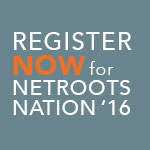After a great run, the Winning the Internet blog has been retired. However, you can still keep in touch with New Media Mentors here.

Brenda Foster

Brandi Horton
As we gear up for Netroots Nation 2013, we’re taking a closer look at some of the convention’s hottest training sessions. We’re interviewing the trainers and taking you inside some of online activism’s most popular and elusive topics.
Today we’re interviewing Brandi Horton and Brenda Foster, who’ll be leading Defending Your Life’s Work: Measuring Impact to Evaluate Social Change.
NN13 Training Session
Defending Your Life’s Work: Measuring Impact to Evaluate Social Change
The digital world is bursting with ways to count things—followers, friends, fans, likes, retweets, hashtags and plus ones. But what are you really measuring? And how do you know if your hard work is making any difference? Transmedia campaigns—at least the most successful ones—are about more than just reach. They’re most effective when they’re crafted to achieve realistic goals and objectives and monitored for outcomes and impact. Evaluation gives credence to your work. It can be your best advocate when determining audiences, messages and strategies. During this training, you will learn about effective, DIY ways to measure success, learn from mistakes and defend your work.
Interview
Q: Tell us about your experience with evaluating social change.
Brenda: Groans. Head shaking. That’s what we see most of the time when we ask people how they’re going to evaluate their social change work. Products are easier. If you sell something, that’s a good indicator that your plan worked. Social change is harder, because the ultimate result can take decades or a lifetime to achieve. That doesn’t mean the incremental work getting there isn’t valid. We have to know how to show progress along the way.
Brandi: People ask us to prove the value of communications every day. It’s something we all need to know in order to continue making the world a better place. But proving that communications is making a difference takes a little tenacity, a little ingenuity and a little elbow grease. Some of it is counting. Some of it is anecdotal or personal experiences. There are a lot of ingredients that tell the social change story. And we all need to agree that’s totally OK.
Q: In your opinion, what is the most common mistake people make when measuring their work?
Brandi: Just because you’ve reached one bazillion people doesn’t mean you’ve made an impact. We have to stop seeing reach as the end game. What we’re really trying to do as cause communicators is motivate and engage.
Brenda: Most people see evaluation as a final step. They put together a program, implement it, then check to see if it worked. That approach is little more than armchair quarterbacking. Real evaluation starts the first time you think about a project. When you’re setting it up, you need to know if you have enough support and resources to move to the next step. It’s a big waste of energy, time and money to identify those flaws after a project fails.
Q: What is the most important thing to consider when evaluating social change?
Brenda: You’re being evaluated every day, whether you intend to or not. Almost every organization has a closet in the office filled with stacks of materials that they never use. Think of how much money and effort you would save if you really invested in evaluating from the beginning so that your communication is exactly what your audience needs and wants.
Brandi: The most important things to consider is the logic behind your argument. You have to know what you’re trying to prove and whether your path to get there makes sense.
Q: Why should folks attend your session at Netroots Nation, and how can they connect with you?
Brandi: Anyone who’s communicating about anything needs to prove that what they’re doing works. And by communicating, we mean talking, texting, Tweeting, whatever. Follow me at @bld177 or email at bhorton@vancomm.com.
Brenda: There are three big investments we make in social change work—our time, our money and our hearts. None of these should be wasted on efforts that won’t achieve our goals and, ultimately, make the world a better place. Glad to chat @gabguru or bfoster@vancomm.com.
To attend this training, or one of the 39 others at Netroots Nation 2013 in San Jose, register now.




Comments are closed.